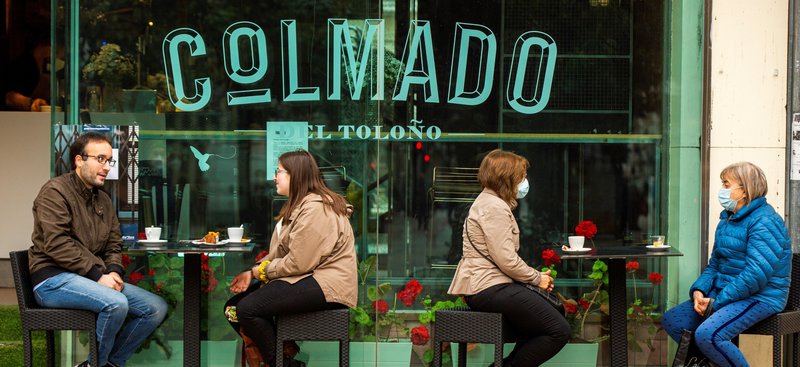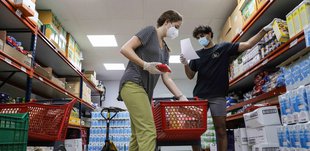Consumption in the spotlight
Getting over the coronavirus pandemic is supposed to lead to more responsible habits, but with a potential economic crisis on the horizon the same efforts at sustainability cannot be expected of everyone
One aspect to come out of the lockdown was a prediction that a more sustainable model of society would emerge from the crisis. For now, though, it seems we are spending more on disposable products and are wary about public transportation. It seems fear of coronavirus is outweighing the commitment to sustainability. Added to this are fears of an upcoming economic crisis. With this in mind, the big question is: what will the post-pandemic consumer look like?
Pilar Medina, professor of consumer psychosociology at Pompeu Fabra University, says that moments of crisis can be either an opportunity to change behaviour or a step back reaffirming previous positions. “The voices telling us that this would bring change were based on the desire for a different future; they were statements made out of fear. But real change can’t come from fear. We’ll see who really changes their behaviour and who doesn’t,” she says. She also points out that for consolidated change, individual reflection is not enough, as the economic structures in which the individual is immersed also have to change.
The present situation is generating contradictions. “For example,” says Medina, “with teleworking we have the opportunity to avoid travel and this brings us closer to local consumerism. It’s perfect, as everyone wins, but firms need to accept that we must continue teleworking. If we’re forced back to the office, it’s no longer possible. And we mustn’t forget that a culprit in our consumption habits is the current economic structure.” For now, the system is warning us that a great crisis is coming. “We’re being told that we need to consume as we did before if we don’t want jobs to be lost. The discourse of economic fear is spreading, practically telling us that it’s our moral duty to spend. That means that if consumption is at the service of the previous system, then the opportunity for change offered by the crisis is neutralised,” the professor insists.
Responsible consumption
There was already a need for more responsible consumption before the crisis. In Catalonia, the Catalan Consumer Agency carried out a survey of 1,000 people in April to determine the impact of coronavirus on consumers. As well as obtaining data, it also gathered opinions on future trends. Thus, 60% of respondents were convinced that coronavirus would increase responsible consumption, while almost 40% predicted that in the future they would have less income. But will responsible consumption be compatible with fewer resources? Can we ask people on low incomes to look at what they are buying?
Medina says we must be aware that there are consumers who cannot afford to think about it. “Changes in consumption habits usually come from the middle and upper classes. Not everyone has the same decision-making ability about their environment as those in a more comfortable economic situation.” And the fact we are not all in the same position is something “the neoliberal economic system likes to forget,” she adds.
According to a report by experts from Catalonia’s Open University (UOC), the most affected households will have to reduce spending and pay more attention to offers in the near future. “Many private labels will benefit from the situation, as a lower economic capacity will lead the consumer to look for value for money”, says Juan Carlos Gázquez-Abad, associate professor of economics and business studies at the UOC.
One of the clear effects of the lockdown has been an increase in distance shopping. “Many consumers have had to try online shopping and have seen how easy and safe it is,” says Gázquez-Abad. A survey by the Catalan Consumer Agency found that 5% of Catalans bought online for the first time during the lockdown, although the total sales of this type decreased because people stopped buying tickets for shows or trips online.
The lockdown also meant that the sector of the population that bought less online, those over 55, had a greater need to do so. “Especially those over 70, who are the most vulnerable to the disease and who have had to stay at home more, often without the help of relatives,” says Neus Soler, also a professor at the UOC.
Data from the consulting firm Kantar shows that even the distance purchasing of fresh produce has increased. “In the food industry, the sale of fresh produce online hasn’t been a success: the consumer preferred to buy this type of product in person. But the lockdown changed that and if the consumer sees that the product delivered to their home meets expectations, it’s likely that after the crisis they’ll continue to buy online,” adds Soler.
More automation
One of the changes in the future in terms of consumption could come from automation. During the lockdown, there was already an increase in shopping by what is called automated commerce. This is when the customer schedules an automatic purchase of products that they will need regularly. These are recurring purchases of cleaning products, personal care products, certain foods, or pet food. The convenience of receiving the products at home when they are needed leads the experts to believe that automated commerce could continue to grow.
In any case, the coronavirus crisis has shown that online shopping and local consumption are not incompatible. “Before, distance shopping was linked to large companies, but now many small companies have had to adapt to the situation, allowing us to buy online but from local shops,” says Júlia Terés, legal manager for the Organisation of Consumers and Users of Catalonia.
In terms of face-to-face shopping, during the lockdown, neighbourhood supermarkets gained ground over the large hypermarkets due to the fear of contagion, and it remains to be seen whether this trend will continue. “There are a lot of people who are afraid to go to the big stores. Possibly this will boost small local businesses, which offer a quality product at a good price and do not have crowds of people,” says Ana Isabel Jiménez Zarco, another UOC professor.
Medina says we must heed the lessons of the crisis. “Less traffic, less noise, less pollution, more child-friendly cities,” she says. She also points out that town planning is closely linked to consumption and gives as an example a Parisian project to find ways for locals to cover all their needs within a 15-minute radius on foot or by bicycle, including work, shopping, school, the doctor’s, and so on. Yet, she also warns: “we have to be realistic, we can’t put the same pressure to consume responsibly on someone in a privileged situation as someone in a precarious one.”
feature
Buying fashion
Compulsive buying of cheap fashion in large shopping centres had become a leisure activity for many people. Post-Covid, will hygiene measures make it less fun to try on clothes? Will consumption go down? Or will the urge to go out and spend overcome the fears? Professor Neus Soler believes that even if people have already become more environmentally aware, economic difficulties will make them put their individual interest above that of the collective or community. Professor Pilar Medina argues that consumers must continue to be made aware so that they act responsibly, but without apportioning blame. “Maybe you can’t afford to buy organic products, but maybe you can refrain from buying that t-shirt for three euros because you know what’s behind it,” she adds.




